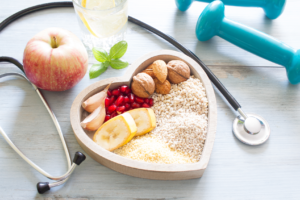
Heart Health: A Functional Medicine perspective
How important is the heart?
The heart is the center of circulation, pumping blood to and from the body and lungs to keep the whole body oxygenated. Without oxygen, the body cannot function. The heart does not catch a break. It beats for the span of an individual’s life. Just like a machine which never shuts down, ongoing maintenance is required. It is crucial to make sure it is always functioning properly. Dysfunction of the heart has become one of the leading causes of all-cause mortality in the world.
How can we care for our hearts?
Below are a few practical things to do to help keep your heart healthy.
- Diet
- Avoid refined sugars and sugary foods. Sugar causes inflammation which can quickly cause cholesterol to be oxidized (rust). This can cause formation of plaque in the arteries around the heart. This can cause heart dysfunction.
- Just like sugar, alcohol can cause inflammation which can cause heart dysfunction. It is best avoided.
- Avoid the combination of carbohydrate intake and saturated fat. Carbohydrate intake such as white potatoes, white rice, and pasta can cause the saturated fat to be converted to LDL cholesterol. This can cause plaque formation.
- Instead, eating good fats such olive oil, lean meats such as chicken, turkey, fish, lean beef can help in balancing cholesterol. Adding good fiber in non-starchy veggies to your diet also helps to keep your heart from dysfunction.
- Red foods such as beets, pomegranate, berries, and hibiscus tea are great for the heart in various ways-including increased nitric oxide, anti-inflammatory and antioxidants.
- Lifestyle
- Exercise is great for the heart. Start slow and work up to rigorous exercise is key. The heart is a muscle. One cannot aim to start weightlifting at 200 pounds when they cannot lift 20 pounds. Start with a walk, then a jog, then a run, then a sprint if that. The key is to consistently be doing something.
- Drinking lots of water. The recommendation is 1/2 of your body weight in ounces per day. This helps in making sure that there is adequate circulation. It’s important to add electrolytes and minerals to at least 16 ounces of water a day to improve vascular function.
- Embrace some relaxation techniques. This includes, but is not limited to stretching, meditation, and breathing exercises. This reduces the stress on the heart.
- Frequent laughing is very heart healthy. This reduces stress on the heart and enhances circulation by increase vascular function through preserving the elasticity of blood vessels.
- Supplemental Nutritional Support
There are a lot of supplements that we can discuss, but most are individualized to what one’s cardiovascular needs are. The list of supplements below is what I think every individual should be on for heart health maintenance.
- Omega 3 fish oil are vital in reducing inflammation in the heart vessels and muscle.
- Diosmin supports healthy veins, capillaries, and blood flow; promotes healthy lymphatic drainage; and enhances antioxidant activity.
- B vitamins which help in making sure that the blood vessels of your heart do not get inflamed or oxidized.
If you have family, or personal history, of heart disease and are concerned about how to go about the future in a way that is healthy for your heart, I highly suggest that you find a provider who can guide you through this journey.
We at Carpathia would be glad to help you in your journey of attaining and/or maintaining optimal heart health.
Cheers to your heart health!
Daniel Chege, FNP-BC, CRNP

